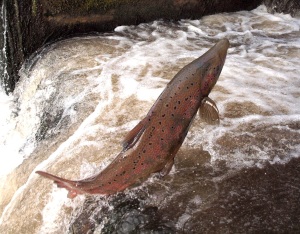You are here
- Home
- Game Fishing Articles: Fishing Tips and Advice
- Salmon Prepare To Spawn As Wet Weather Helps Restore Flows In South West Rivers December 2011
Salmon Prepare To Spawn As Wet Weather Helps Restore Flows In South West Rivers December 2011
********** News Release **********
December 19th 2011
Salmon prepare to spawn as wet weather helps restore flows in south west rivers The wet weather has been bad news for Christmas shoppers, but couldn’t have come at a better time for salmon and sea trout returning to the region’s rivers. After one of the driest years on record, flows in many of the region’s rivers have been exceptionally low making it difficult for salmon and sea trout to migrate upstream to spawn. Thankfully, the recent wet spell has co-incided with the time of year when the Atlantic Salmon has only one thing on its mind – sex! Throughout December adult fish battle their way upstream to reach spawning grounds in the headwaters of our rivers. On arrival, female salmon lay their eggs in riverbed gravels known as ‘redds’ where the eggs are immediately fertilised by a male fish. These spawning grounds are carefully monitored by the Environment Agency to gauge the breeding success of salmon on rivers including the Fowey and Camel in Cornwall, Tamar, Dart, Exe and Teign in Devon and the Avon, Frome and Stour in Dorset.
The Agency and its partners help boost salmon and sea trout stocks by installing fish passes and removing barriers and obstacles on rivers to make it easier for salmon to make their annual migration upstream. It recently carried out a ‘Dam Buster’ operation on Dartmoor to remove a weir that had been a serious obstruction to salmon migrating to the headwaters of the River Taw. Normal dismantling methods were ruled out because of the remote location and difficulty getting heavy equipment to the site, so the weir was removed in a controlled explosion. The scheme was carried out by the Agency in partnership with the Westcountry Rivers Trust. The Agency also recently completed a new fish pass at Wire Hatches near Salisbury. The improvement means it is now possible for salmon to spawn in two separate branches of the Hampshire Avon. Previously they could only migrate up one.

Pictured is a fine male salmon leaping over a weir on the Hampshire Avon. The fish, weighing around 18lb, was photographed by Environment Agency fisheries officer Chris Gardner, who was checking local rivers for signs of fish movement when he captured this stunning image. ‘I noticed a lot of fish jumping at one particular fish pass so picked up my camera and took a series of photos in quick succession. One shot caught the moment a large salmon came leaping up over the pass. It was a spectacular sight,’ said Chris. ‘Conditions have become difficult for migratory fish because it has been so dry.
The recent rain has arrived just in time and given the fish a temporary reprieve. It is very satisfying to see mature salmon migrating up a river to spawn and know we are helping them on their journey by removing obstacles and putting in fish passes.’ ‘Salmon and sea trout are important species in the South West and are indicators of good water quality. They help us monitor the health of our rivers and make a very welcome and valuable contribution to the local economy,’ said Simon Toms, the Agency’s Senior Fisheries Technical Specialist for the region. Salmon are especially vulnerable to poachers at this time of the year.
Anyone seeing suspicious activities on our rivers is advised to call the free Environment Agency 24-hour hotline Tel: 0800 80 70 60.
